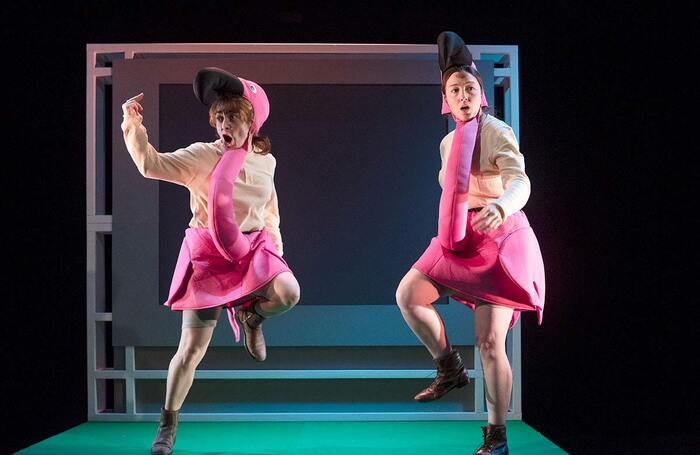SKILFULLY CONSTRUCTED BECKETT-INSPIRED COMEDY
“You’ll be crying with laughter”
Review 13th March 2023. By Tom Wicker, The Stage. Jackson’s Lane, London.
Taking its title from a review of Samuel Beckett’s 1953 existential classic Waiting for Godot, this comedy from Little Soldier Productions melds slapstick humour with a wry sense of the company’s career frustrations. Just an hour long and directed by Ursula Martinez, it runs on several crisscrossing tracks. Its creators and performers, Little Soldier co-founders Mercè Ribot and Patricia Rodríguez, turn up in baggy suits evoking Godot’s hapless duo Vladimir and Estragon. But the scraps of Beckett are woven into a semi-recreation of a 2018 promo for Andalusia that they performed in Westfield Stratford City – a combination that sees them quick-changing into flamingo costumes, cracking laboured jokes and dancing.

There’s a neat visual gag arising from video footage of the pair arriving for that East London gig, which had them questioning their choice of profession. It’s a seamless transition from there to lip-syncing to the words of a few of the many white, male actors to have acted in Waiting for Godot, some of them at the Royal Shakespeare Company in that other Stratford – upon-Avon. In a split second, there is a world of commentary about theatrical status and who has access to the theatrical canon, delivered by two female performers who have too frequently found themselves cast as Spanish maids or sex workers.
Increasingly exhausted repetition is the show’s undercurrent, evoking the themes of Godot even while critiquing it, tongue firmly in cheek. Ribot and Rodríguez’s futile attempts to get the infamously controlling Beckett estate to agree to let them stage the play in full – exchanges shown in projected emails – roll into a hilarious and dispiriting loop of confusion ensuing from the fact that they are two women who want to play five male characters. You’ll be crying with laughter at the absurdity of it.
The skill of the piece, and of Ribot and Rodríguez’s brilliantly engaging and self-effacing clowning, is in the way it lands serious points about bureaucracy, copyright law, crappy corporate gigs and the grinding difficulty of pursuing a creative career. It winks at the audience but sidesteps glibness. From John Biddle’s varied sound design to Verity Quinn’s set and Simon Bond’s lighting, theatre is never treated as just a disposable joke. And it dovetails in the same questions often levelled at Beckett’s play: is it worth the effort of engagement? Does it mean anything? Here, at least, we should be grateful for Little Soldier’s persistence.
Tom Wicker at The Stage
